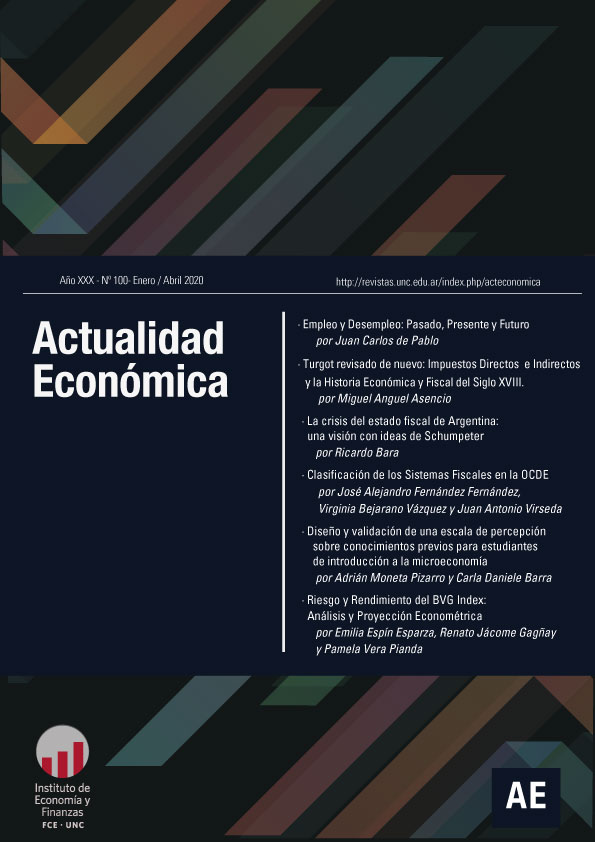La crisis del estado fiscal de Argentina: una visión con ideas de Schumpeter
Palabras clave:
Estado Fiscal, Schumpeter, Crisis, ArgentinaResumen
Joseph Schumpeter escribió en 1918 un artículo que tituló La Crisis del Estado fiscal. Austria enfrentaba, entonces, un grave problema fiscal: debía hacer frente a la deuda acumulada luego de cuatro años de guerra por el Imperio Austro-húngaro que había colapsado como consecuencia del conflicto bélico. Para fundamentar una propuesta de solución desarrolló un esquema teórico e histórico de las relaciones entre la hacienda pública y el sistema económico-político de validez general que se convirtió en un clásico de la literatura sobre las crisis fiscales. El presente artículo trata de utilizar las ideas de Schumpeter para comprender el comportamiento poco satisfactorio de la hacienda pública argentina, por lo menos en los últimos setenta y cinco años y, particularmente, aplicar sus ideas a nuestra situación fiscal actual.
Descargas
Referencias
Boss, A., (1999). “Do We Need Tax Harmonization in the EU?”. Kiel Institute of World Economics, Kiel Working Paper (916).
Cantemir, D., (2013). “Tax Competition - Economic and Financial Policy Instruments”. Knowledge Horizons - Economics, 5(3), 90–93.
Devereux, M., y Loretz, S., (2013). “What do we know about corporate tax competition?” National Tax Journal, 3(66), 745–774.
Devereux, M., Lockwood, B., y Redoano, M., (2007). “Horizontal and vertical indirect tax competition: Theory and some evidence from the USA”. Journal of Public Economics (91), 451–479.
Dima, B., Dima, M., y Barna, F., (2014). “The signaling effect of tax rates under fiscal competition: A (Shannonian) transfer entropy approach”. Economic Modelling (42), 373–381.
Dzialo, J., (2015). “Tax Competition or Tax Coordination? What Is Better for the European Union?” Comparative Economic Research, 18(2), 37-55.
Eggert, W., y Genser, B., (2001). “Is Tax Harmonization Useful?” International Tax and Public Finance, 8(4), 511-527.
Eichner, T., (2014). “Endogenizing leadership and tax competition: Externalities and public”. Regional Science and Urban Economics (46), 18-26.
Epstein, B., Mukherjeeb, R., y Ramnathc, S. (2014). “Taxes and international risk sharing”. Journal of International Economics (102), 310–326.
Feld, L., y Reulier, E. (2005). “Strategic Tax Competition in Switzerland: Evidence from Panel of the Swiss Cantons”. Center for Research in Economics, Management and the Arts. Working Paper.
Goodspeed, T. (2002). “Tax competition and tax structure in open federal economies: Evidence from OECD countries with implications for the European Union”. European Economic Review (46), 357-374.
Han, Y., Pieretti, P., y Zou, B. (2014). “Does size asymmetry exacerbate the inefficiency of tax competition?” Economics Letters (122), 16–18.
Tibulca, I. L. (2015). “Is there evidence of tax convergence in the European Union?” Procedia Economics and Finance (32), 194 – 199.
Islam, R., Madsen, J., y Doucouliagos, H. (2018). “Does inequality constrain the power to tax? Evidence from the OECD?” European Journal of Political Economy, (52) 1-17.
Killian, S., (2006). “Where’s the harm in tax competition? Lessons from US multinationals in Ireland”. Critical Perspectives on Accounting (17), 1067–1087.
Kovács, L., (2005). “Tax Harmonisation versus tax Competition in Europe. European Commissioner for Taxation and Customs”. Conference organized by the Austrian Chamber of Professional Accountants and Tax Advisors Vienna.
Liapis, K., Rovolis, A., y Galanos (2013). “Toward a Common Tax Regime for the European Union Countries”.European Research Studies, XVI, (93)116.
Mankiw, N. G., Weinzierl, M. y Yagan, D. (2009). “Imposición óptima: Teoría y práctica”. Journal of Economic Perspectives, 23 (4) 147-174
Mendoza, E., y Tesar, L. (2003). “Winners and losers of tax competition in the European Union”. National Bureau of Economic Research, WP (10051).
Pinto, C. (2002). “Tax Competition and EU Law”. University of Amsterdam. UvA-DARE (Digital Academic Repository), 81-156.
Redoano, M. (2014). “Tax competition among European countries. Does the EU matter?”. European Journal of Political Economy (34), 353–371.
Reuven, S.-Y. (2007). “Tax competition, tax arbitrage, and the international tax regime”. Oxford University. Centre for Business Taxation. Working paper 07/09.
Simmons, R. (2006). “Does recent empirical evidence support the existence of international corporate tax competition?”. Journal of International Accounting, Auditing and Taxation (15), 16-31.
Szarowska, I. (2010). “Tax burden and competition in the European Union Does it change?” Munich Personal RePEc Archive. Working Paper.
Von Haldenwang, C., y Ivanyna, M. (2012). “A Comparative View on the Tax Performance of Developing Countries: Regional Patterns, Non-Tax Revenue and Governance. Economics”. The Open-Access, Open- Assessment E-Journal, 6 (32).
Zodrow, G., (2003). “Tax Competition and Tax Coordination in the European Union”. International Tax and Public Finance, 6(10), 651-671.
Descargas
Publicado
Número
Sección
Licencia

Esta obra está bajo una licencia internacional Creative Commons Atribución-NoComercial-SinDerivadas 4.0.
Aquellos autores/as que tengan publicaciones con esta revista, aceptan los términos siguientes:
- Los autores/as conservarán sus derechos de autor y garantizarán a la revista el derecho de primera publicación de su obra, el cuál estará simultáneamente sujeto a la Licencia Creative Commons Atribución-NoComercial-SinDerivar 4.0 Internacional que permite a terceros compartir la obra siempre que se indique su autor y su primera publicación esta revista.
- Los autores/as podrán adoptar otros acuerdos de licencia no exclusiva de distribución de la versión de la obra publicada (p. ej.: depositarla en un archivo telemático institucional o publicarla en un volumen monográfico) siempre que se indique la publicación inicial en esta revista.
- Se permite y recomienda a los autores/as difundir su obra a través de Internet (p. ej.: en archivos telemáticos institucionales o en su página web) antes y durante el proceso de envío, lo cual puede producir intercambios interesantes y aumentar las citas de la obra publicada. (Véase El efecto del acceso abierto)









